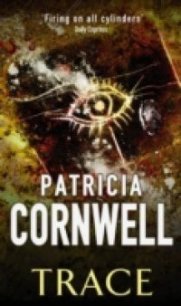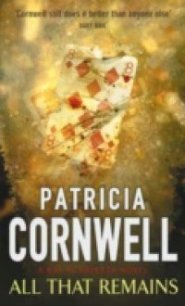Cruel and Unusual - Cornwell Patricia (читать книги без регистрации полные .txt) 📗
Instead, I discovered that what Waddell had considered “extremely confidential” and had wanted buried with him were cash register receipts. Inexplicably, five were for tolls; three others were for meals, including a fried chicken dinner ordered at a Shoney's two weeks earlier.
2
Detective Joe Trent would have looked quite youthful were it not for a beard and receding blond hair that was turning gray. He was trim and tall, a crisp trench coat belted tightly around his waist, his shoes perfectly shined. He blinked nervously as we shook hands and introduced ourselves on the sidewalk in front of Henrico Doctor's Emergency Center. I could tell he was upset by Eddie Heath's case.
“You don't mind if we talk out here a minute,” he said, his breath turning white. “For privacy reasons.”
Shivering, I tucked my elbows close to my sides as a Medflight helicopter made a terrific noise taking off from the helipad on a grassy rise not far from where we stood. The moon was a shaving of ice melting in the slate-gray sky, cars in the parking lots dirty from road salt and frigid winter rains. The early morning was stark and without color, the wind sharp like a slap, and I observed all this more keenly because of the nature of my business here. Had the temperature suddenly risen forty degrees and the sun begun to blaze I do not think I could have felt warm.
“What we got here is real bad, Dr. Scarpetta.”
He blinked. “I think you'll agree we don't want the details getting out.”
“What can you tell me about this boy?” I asked.
“I've talked to his family and several other people who know him. As best I can ascertain, Eddie Heath is just your average kid - likes sports and has a paper route, has never gotten into any trouble with the police. His father works for the phone company and his mother sews for people out of the home. Apparently, last night, Mrs. Heath needed a can of cream of mushroom soup for a casserole she was fixing for dinner and asked Eddie to run over to the Lucky Convenience Store to get it.'
“The store is how far from their house?” I asked.
“A couple of blocks, and Eddies been there any number of times. The people working the counter know him by name.”
“He was last seen at what time?”
“Around five-thirty P.M. He was in the store a few minutes and left.”
“It would have been dark out,” I said.
“Yes, it was.”
Trent stared off at the helicopter transfigured by distance into a white dragonfly softly thudding through clouds. “At approximately eight-thirty, an officer on routine patrol was checking the back of buildings along Pattersom and saw the kid propped up against the Dumpster.”
“Do you have photographs?”
“No, ma'am. When the officer realized the boy was alive, his first priority was getting help. We don't have pictures. But I've got a pretty detailed description based on the officer's observations. The boy was nude, and he was propped up, with his legs straight out and arms by his sides and head bent forward. His clothing was in a moderately neat pile on the pavement, along with a small bag containing a can of cream of mushroom soup and a Snickers bar. It was twenty-eight degrees out. We're thinking he may have been left there anywhere from minutes to half an hour before he was found.”
An ambulance halted near us. Doors slammed and metal grated as attendants quickly lowered the legs of a stretcher to the ground and wheeled an old man through opening glass doors. We followed and in silence walked through a bright, antiseptic corridor busy with medical personnel and patients dazed by the misfortunes that had brought them here. As we rode the elevator up to the third floor, I wondered what trace evidence had been scrubbed away and tossed in the trash.
“What about his clothes? Was a bullet recovered?” I asked Trent as the elevator doors parted.
“I've got his clothes in my car and will drop them and his PERK off at the lab this afternoon. The bullet's still in his brain. They haven't gone in there yet. I hope like hell they swabbed him good.”
The pediatric intensive care unit was at the end of a polished hallway, panes of glass in the double wooden doors covered with friendly dinosaur paper. Inside, rainbows decorated sky blue walls, and animal mobiles were suspended over hydraulic beds in the eight rooms arranged in a semicircle around the nurses' station. Three young women worked behind monitors, one of them typing on a keyboard and another talking on the phone. A slender brunette dressed in a red corduroy jumper and turtleneck sweater identified herself as the head nurse after Trent explained why we were here.
“The attending physician's not in yet,” she apologized.
“We just need to look at Eddies injuries. It won't take long,” Trent said. “His family still in there?”
“They stayed with him all night.”
We followed her through soft artificial light, past code carts and green tanks of oxygen that would not be parked outside the rooms of little boys and girls were the world the way it ought to be. When we reached Eddies room, the nurse went inside and shut the door most of the way…
“Just for a few minutes,” I overheard her say to the Heaths. “While we do the exam.”
“What kind of specialist is it this time?” the father asked in an unsteady voice.
“A doctor who knows a lot about injuries. She's sort of like a police surgeon.”
The nurse diplomatically refrained from saying I was a medical examiner, or worse, a coroner.
After a pause, the father quietly said, “Oh. This is for evidence.”
“Yes. How about some coffee? Maybe something to eat?”
Eddie Heath's parents emerged from the room, both of them considerably overweight, their clothes badly wrinkled from having been slept in. They had the bewildered look of innocent, simple people who have been told the world is about to end, and when they glanced at us with exhausted eyes I wished there were something I could say that would make it not so or at least a little better. Words of comfort died in my throat as the couple slowly walked off.
Eddie Heath did not stir on top of the bed, his head wrapped in bandages, a ventilator breathing air into his lungs while fluids dripped into his veins. His complexion was milky and hairless, the thin membrane of his eyelids a faint bruised blue in the low light. I surmised the color of his hair by his strawberry blond eyebrows. He had not yet emerged from that fragile prepubescent stage when boys are full-tipped and beautiful and sing more sweetly than their sisters. His forearms were slender, the body beneath the sheet small. Only the disproportionately large, still hands tethered by intravenous lines were true to his fledgling gender. He did not look thirteen.
“She needs to see the areas on his shoulder and leg,” Trent told the nurse in a low voice.
She got two packet of gloves, one for her and one forme, and we put them on. The boy was naked beneath the sheet, his skin grimy in creases and fingernails dirty. Patients who are unstable cannot be thoroughly bathed.
Trent tensed as the nurse removed the wet-to-dry dressings from the wounds. “Christ,” he said under his breath. “It looks even worse than it did last night. Jesus.”
He shook his head and backed up a step.
If someone had told me that the boy had been attacked by a shark, I might have gone along with it were it not for the neat edges of the wounds, which clearly had been inflicted by a sharp, linear instrument, such as a knife or razor. Sections of flesh the size of elbow patches had been excised from his right shoulder and right inner thigh. Opening my medical bag, I got out a ruler and measured the wounds without touching them, then took photographs.
“See the cuts and scratches at the edges?”
Trent pointed. “That's what I was telling you about. It's like he cut some sort of pattern on the skin and then removed the whole thing.”



